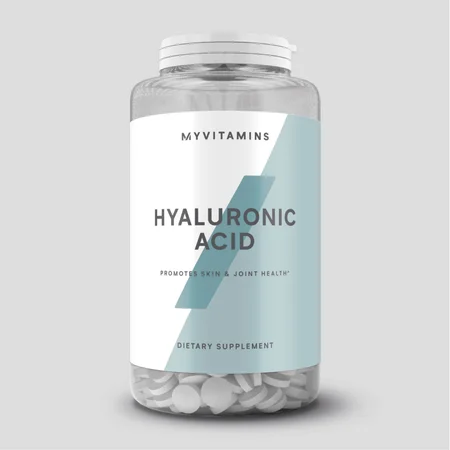
What is hyaluronic acid?
Hyaluronic acid (HA) is a naturally occuring substance found in our joints, eyes, and nails. It provides structure and helps keep moisture in the tissues where it is found. It also helps to lubricate and cushion our joints thanks to its elastic chemical properties.1
Where does it come from?
Hyaluronic acid occurs naturally in our bodies but can also be manufactured into many forms - like creams, serums, injectables, and supplements.2 Because of its firming and moisturizing power, there is great interest in the role that hyaluronic acid can play in anti-aging.
Hyaluronic acid benefits:
1. Hyaluronic acid can slow down skin aging
Research has shown that the levels of hyaluronic acid in our skin decrease as we age. For this reason, boosting the amount in our skin can help slow down the signs of aging. You’ll see many topical creams and serums with HA on the market, but only some have the right concentration and molecule size to be effective.2 For this reason, oral supplements are available to support skin benefits.
2. It may help with eye health
Hyaluronic acid has been shown to support successful cataract surgery procedures. As this is a common issue for many in later stages of life, it can play a role in successful surgeries to preserve vision and quality of life.1
3. It has been proven to help with wound healing
When our skin has an open wound that needs to heal, we need the newly forming skin to be healthy, elastic, and moisturized - all things that hyaluronic acid can support.1 While wound healing can be very serious in those with other conditions, like diabetes, this is a crucial application for HA.
4. It could help with joint pain
Because hyaluronic acid has been approved for cosmetic procedures (like wrinkle injections), there is interest in using it as an injected treatment for knee pain and other osteoarthritis. Some research indicates that hyaluronic acid can have overall anti-inflammatory properties.1 While logical supports that joint injections could be beneficial, additional study is needed before this becomes a recommended treatment.2
Hyaluronic acid dosage and when to take
Are there any side effects?
Anytime you take a supplement or use a topical substance on your skin, you could have an allergy or reaction to any of the ingredients. You might want to test a small area of your skin especially if it is sensitive. However, there has not been any negative side effects shown in HA supplementation.2 Side effects from injections still need to be studied.
Take Home Message
Hyaluronic Acid occurs naturally in the body and comes with a wide array of anti-aging benefits related to skin and joint health. It's even been shown to have positive effects related to eyesight!
If you are going to supplement your routine with HA then 100 to 200mg per day is recommended.

A Fordham University graduate, Ian majored in communications and media studies with a focus in journalism and a minor in anthropology during his time at college. Here, he wrote for the university newspaper ranked top ten in the nation.
A competitive athlete for most of his life, Ian has spent almost a decade working as an ocean rescue lifeguard in New Jersey. Within that role, he has competed in endurance sports competitions against other lifeguards for the last 8 years.
As a lifelong surfer, Ian spends most of his spare time in the ocean regardless of the time of year. He also enjoys distance running, photography, and frequently spending entirely too much money on concert tickets.
1. Goa, K.L., Benfield, P. Hyaluronic Acid. Drugs 47, 536–566 (1994). https://doi.org/10.2165/00003495-199447030-00009
2. Papakonstantinou, E., Roth, M., & Karakiulakis, G. (2012). Hyaluronic acid: A key molecule in skin aging. Dermato-endocrinology, 4(3), 253–258. https://doi.org/10.4161/derm.21923








